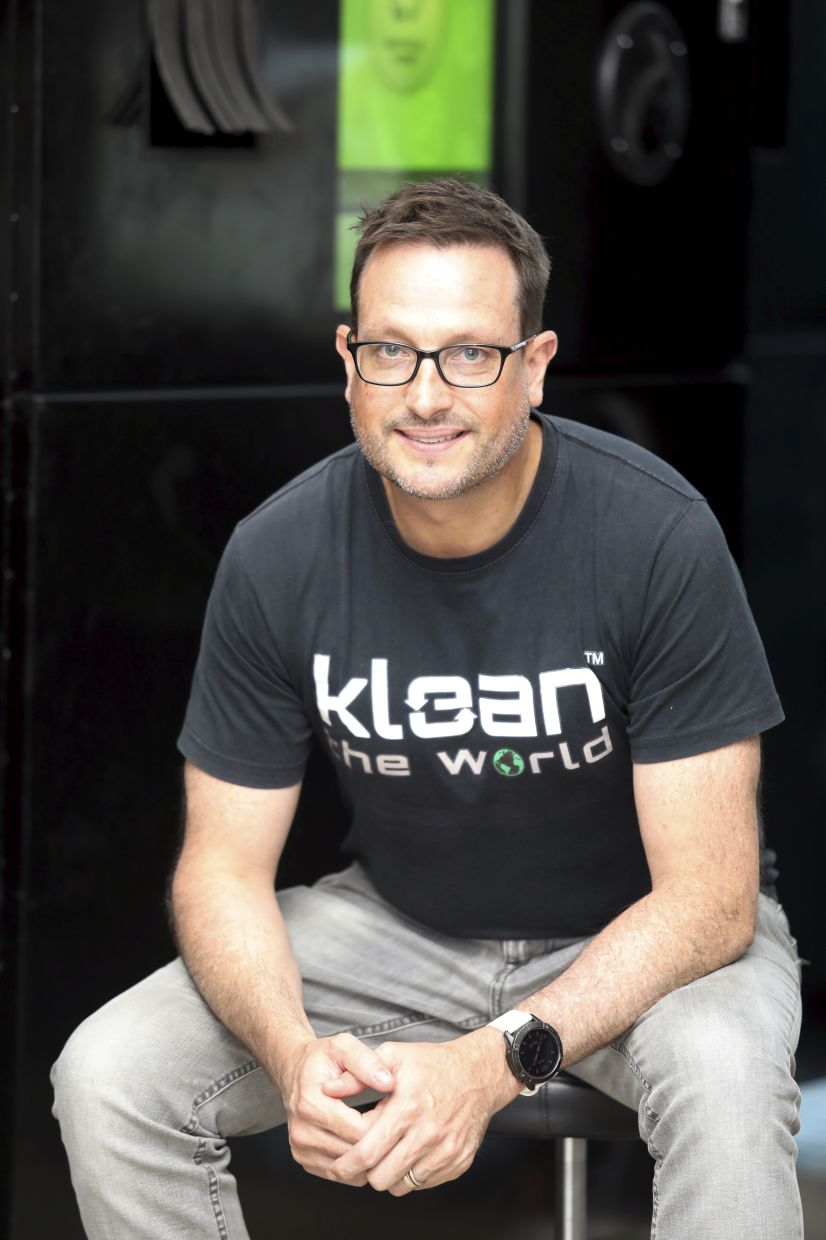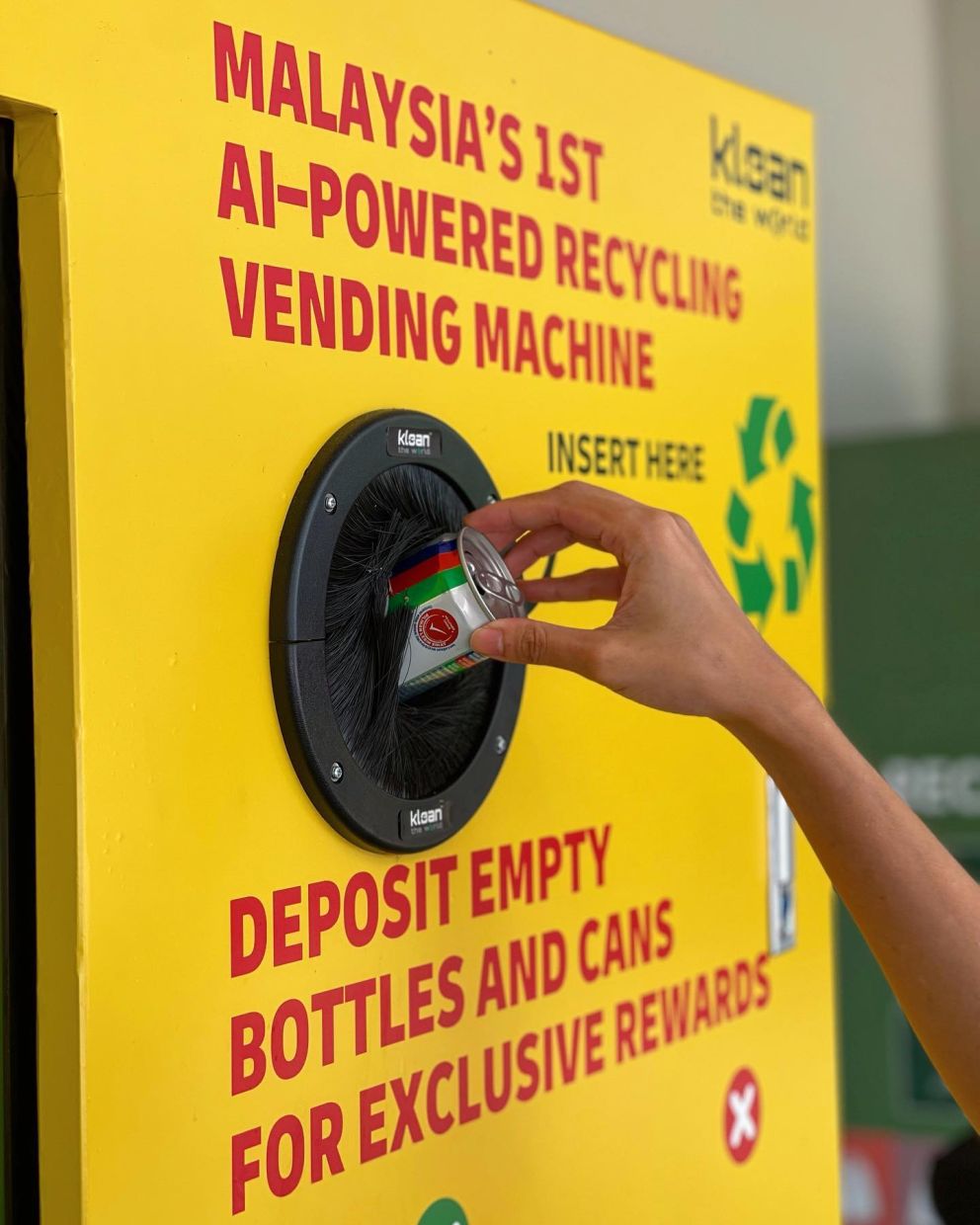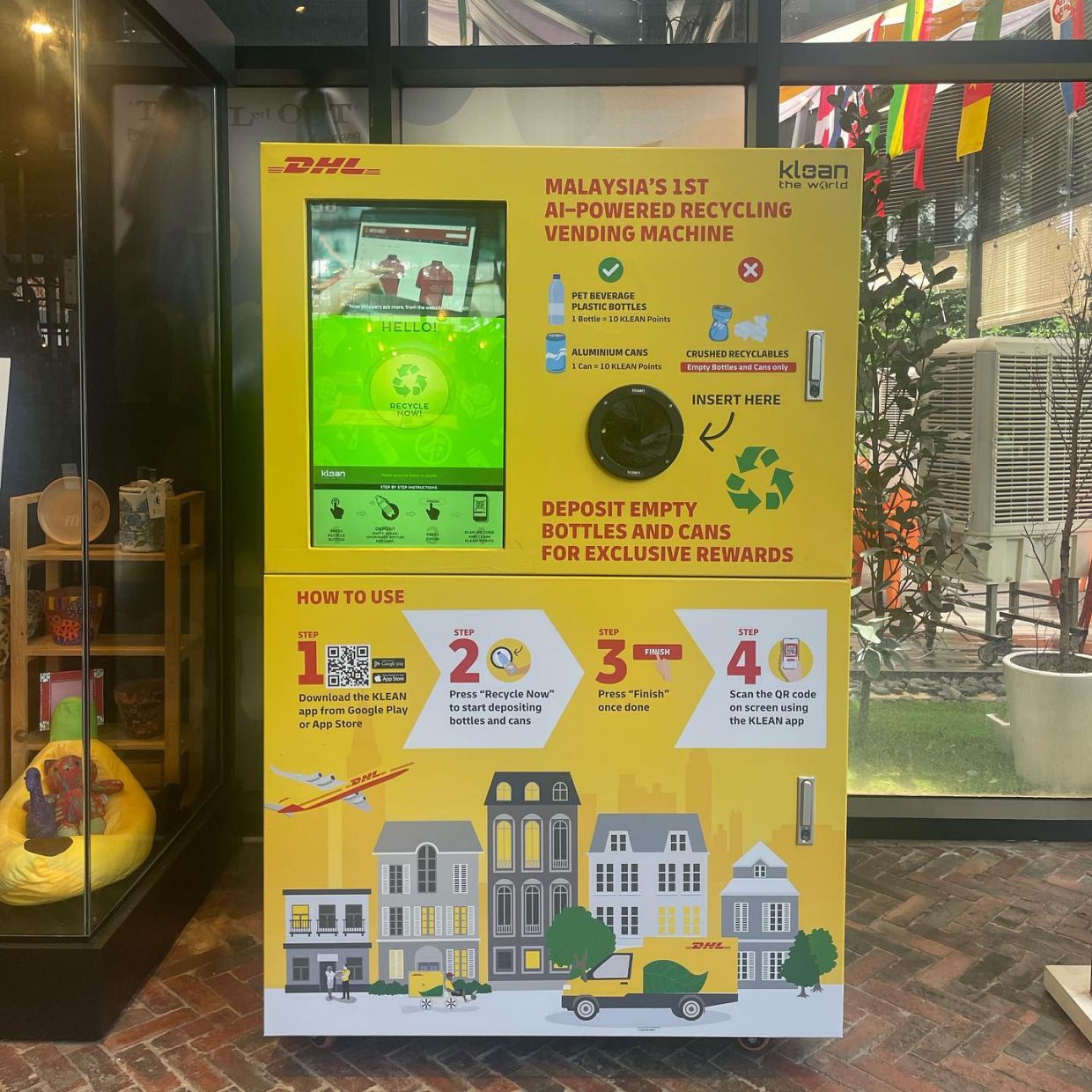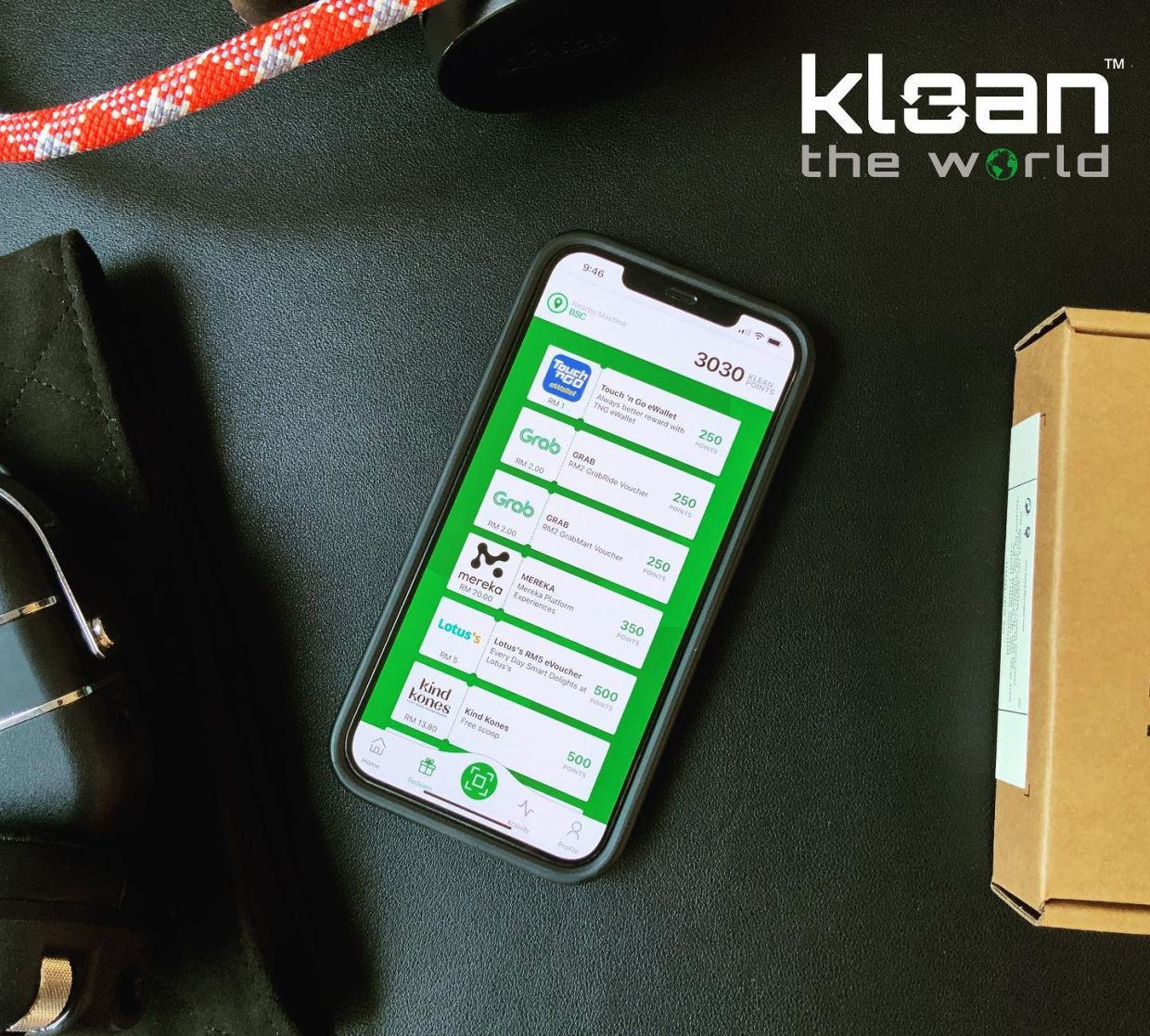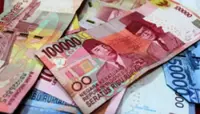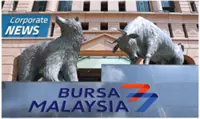
Klean has more than 60 distinct reverse vending machines in operations now and is scaling up slowly.
WANDER around the Klang Valley long enough, and you’re bound to come across one of Klean’s distinct reverse vending machines. Humbly seeking your used plastic bottles, cans and takeaway containers in exchange for points-based rewards, they’ve taken up residence in shopping centres, office towers and condominium buildings.
“We’ve gained 60,000 users in a year and a half, so it’s done really well. We’ve got more than 60 machines now and we’re scaling up slowly,” shares Dato’ Dr Nick Boden, CEO and founder of Klean.
The local start-up aims to bolster recycling in the country with its pioneering AI-powered reverse vending machine ecosystem. Through the Klean Recycling App, users can collect points for each recyclable they drop off, and redeem them for rewards from partners like Grab, Touch ‘n Go and Amanah Saham.
According to Boden, whose professional background is in healthcare, the idea for Klean began to form with the use of a 3D printer to create customised in-soles for flat feet. This led to a CSR initiative that provided 3D printed prosthetic hands to children who have genetic deformities or have lost or injured their hand. As a way of integrating environmental awareness into the project, the recipients were asked to collect plastic PET bottles and present them in return for the prosthetic hands.
Following that, he found inspiration while in Germany after seeing first-hand the local deposit return scheme at work. Bottled and canned drinks are sold with a deposit of about 25 cents, and consumers are incentivised to bring the empty containers to reverse vending machines to recover the fee.
“I wanted to build a reverse vending machine here, but I didn’t like the idea of scanning for a barcode. We wanted to use AI instead,” he says. As far as he’s aware, Klean’s machines are the only ones to utilise AI to recognise various types of containers.
Boden further explains that each machine has a dashboard which collects information about the quantity of containers recycled, carbon footprint scoring and recycling demographics. This data has proven invaluable to partner organisations striving to make meaningful strides towards circularity and sustainability.
Can you share more about how and why Klean is incorporating AI and digital technology within its platform?
We’re all about developing ESG into more of a circular economy framework. Originally we had sold some of our machines as a capital expenditures investment, but we later moved away from a build-and-sell model to more of a recycle-as-a-service model.
Instead of buying a machine, our clients pay a monthly rate and we help them with locations, provide them with data and update the AI which is constantly learning new containers. We find this model is more palatable for companies.
At the end of the day, it’s all going to be about data - what are you collecting back, who’s recycling, what sort of carbon footprint does this have? We recognise that technology and infrastructure are important components for a circular economy.
In what ways can businesses benefit?
In discussions with our clients, we will let them know, “You will spend money, and you might not get it back in cash, but it can bring returns in terms of PR coverage or new customers.” And we’ve proven that, with Amanah Saham for example: 40% of people who converted their plastic into points and redeemed them with Amanah Saham were new customers.
It’s a touchpoint, it ticks many boxes and it provides ESG data. Aside from the physical machines, we had to build a very robust dashboard that collects all the data from our users, and an app that would be able to manage the whole user experience.
Essentially we are collecting data into one portal, and the information can also be used by the government to plan their spending more efficiently. It really is able to influence and impact in a way that no other solution can.
On the more material side of things, where does the waste collected by Klean go?
In oil and gas terms, you’ve got the upstream and the downstream, and we are kind of the mid-stream - we are a container recovery technology that helps make sure there’s an easy way for people to return those containers. We aren’t a recycling plant and don’t do the recycling, but there are many capable, licensed recyclers that will regularly come and collect from our storage areas. We work with recyclers who melt aluminium into ingots and PET plastics into pellets or fibre for clothing.
Are there plans to expand to other materials other than food and drink containers?
Well, we’re about to launch an e-waste vending machine with Telekom Malaysia, and we’re also looking at solutions involving other types of containers.
We are trying to push for a proper scheme for people to separate their waste at home, with something called the Klean bag which will use our existing reward system. Our data shows the most popular recycling points are petrol stations and convenience stores, so we want to create the mechanism and infrastructure for people to recycle at those places.
It will involve a mesh bag with a QR code, so you scan it into our app, put your bag of bottles in, and our backend will credit points to your account 48 hours later. However, it requires a container deposit scheme to really get it in scale, and ultimately governments are the ones able to drive these things.
Is it difficult managing so many moving parts and partners?
Like most start-ups, we try to be smart with plugging into the gig economy. Our factory assembles our technology into the machine, but we have a third party in Sungai Buloh that manages the manufacture of the machine’s shell, we use an existing logistics company to deliver it and we work with Blueshark to use their e-motorbikes to reduce our footprint.
So we don’t have our fingers in all those pies, we instead run the infrastructure and collect all the data, and work with partners in their journey. It hasn’t been that hard, logistics is probably the biggest challenge for us. That and getting corporates to put their money where their mouth is and actually do impactful ESG work.
Does it take a lot of convincing for businesses to get onboard?
I think they do get it, but they have their ESG requirements which are very technical, and not necessarily very practical. For example, you’ll have a bank that has a green branch, but their electricity comes from a coal-fired power source – what’s green about that? Rather, you could encourage people to do most of their banking without having to drive to the branch.
I think there’s an opportunity to rethink what ESG really is, above and beyond the metrics, to how people understand it and experience it, and the kind of behavioural change these investments make.
What has the response from the public user side been like?
It’s been amazing, we can’t put enough machines up, and empty them fast enough. These are good problems for us to have. So Malaysians want this and we get a lot of requests to set up machines, but we’re still a business and need to have them funded.
I think there are great opportunities for corporations in Malaysia in terms of branding, because they can wrap and customise the machine’s exterior and put their ads on it, or they can be part of the point redemption system on the app. There are lots of different touchpoints they can use, it just requires a bit of nuanced thinking around it.
What are Klean’s goals for 2024?
The focus for us is to keep scaling. I think we are reaching maybe 65 machines by the end of this year, but we really want to hit that magic number of 100. That will give us scale, and help us prove the Out-of-Home side of our business which are the adverts on the side of the machines.
We also aim to work with the government and convince them that the sooner they start a container deposit scheme, the better it is for Malaysia - not just for from an environmental point of view but also to get us out of all these top 10 lists for ocean plastics, mishandling of plastic waste and importing plastic waste.
We are looking to expand to more rural areas, and to places like Penang and East Malaysia - we currently have some interest from Sarawak to take our technology there. We’re really just focused on Malaysia, so that’s what our goal is at this stage.
This article first appeared in Star Biz7 weekly edition.






